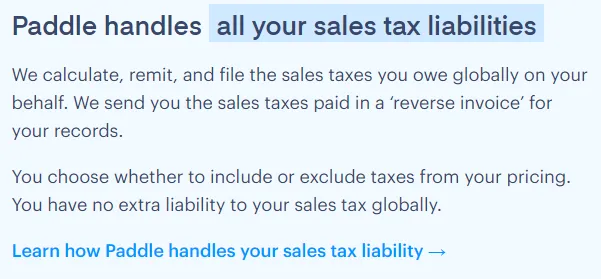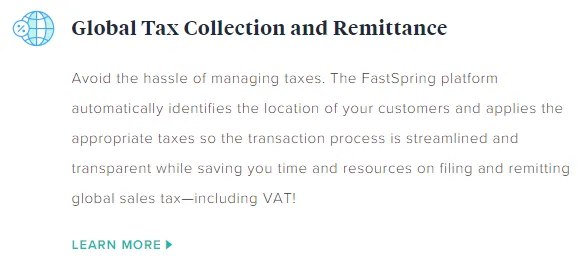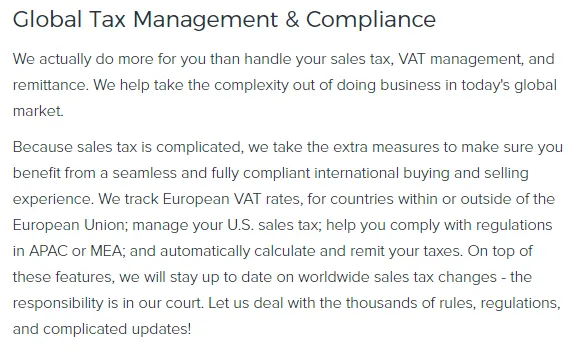E commerce and taxes
Created: 2020-03-23 18:53:49 -0700 Modified: 2021-06-10 08:31:09 -0700
Note: I turned most of this into a blog post that’s probably a little bit more readable.
Section titled Note: I turned most of this into a blog post that’s probably a little bit more readable.On March 23rd, 2020, I finally looked into what it would take to sell courses online through my own site. I learned a lot about e-commerce and taxes and wanted to share that information here.
Whenever you make a sale, it can be subject to a consumption tax, typically sales tax or VAT depending on the country. The specific rate is based on a combination of both the buyer’s and seller’s governments along with the type of item sold. Many countries (including the US) don’t have a single tax rate throughout their borders. As a seller, you have to know this rate so that you can add it to the price. The buyer then pays the tax. However, the seller has to remit that amount to the appropriate government at a particular frequency (typically every quarter).
This page, despite being part of the developer API for TaxCloud, has some great information about the complexity of this process just for the US. Here’s some copy/pasted information describing that complexity:
Frequently we get calls from developers seeking sales tax rates. We cannot say this enough,rates are not the challengefor sales tax compliance. The actual challenge for sales tax compliance involves multiple factors:
- Rates (easiest)
- Jurisdiction identification (there are thousands of state, local, and special jurisdictions, all with varied rules and exemptions)
- Exemption certificates for exempt entity purchasers
- Sales tax holidays based upon product or service category and transaction date
- Assorted caps and thresholds based upon destination and/or price
- Rounding rules
- Taxability — Full or partial exemptions based upon product or service category—This is the hardest part.
If you live in the US and you’re lucky enough to be in one of the 25 states (as of 3/23/20) that supports the Streamlined Sales and Use Tax Agreement, then you don’t actually have to pay TaxCloud in order to use their rate-computation API. However, it only works for the US itself for now. You would call into their API with a cart, and it would return the tax to apply for each item.
After that, you could actually use TaxCloud to remit the sales tax for you (reference); they would file returns and debit your account. This has no charge associated with it for any member states with streamlined taxes, but it does have a charge for the other states. You can choose to just have TaxCloud remit taxes for you in the free states and do the rest by yourself if you want.
EU taxes / MOSS (reference)
Section titled EU taxes / MOSS (reference)MOSS = “Mini One Stop Shop” - it’s a scheme that allows you to file VAT with a single EU country for all of the EU countries (then, presumably, that country figures out to remit the taxes to the appropriate countries).
From what I understand of this process:
- You pick the country in the EU to register with.
- They publish currency conversion rates so that you send the correct amount.
- Every quarter, you tabulate all of the VAT that you collected and send it to that country via wire transfer along with the table.
Rest of the world
Section titled Rest of the worldI have no clue; I didn’t get that far. Read below.
Conclusion / Merchant of Record
Section titled Conclusion / Merchant of RecordBy this point, I’d spent a couple of hours doing tax research and I felt like there was no easy solution. Except there is an easy solution if you know what to search for. You can find a service to act as a Merchant of Record (MoR) for you. You authorize them to handle your sales, then they’re the ones who are held liable for processing payment, ensuring compliance with tax laws, and maintaining relationships with financial institutions. Since you’re selling through them, they have to handle remission of taxes, not you. Some of these services absolutely skewer you on costs though, and most of them don’t even advertise their prices without getting your email address first.
Here are some sites I found that do this:
SquareUp (reference where they say they’re an MoR)- note: I called them on 3/24/20, and their sales support didn’t have an answer to whether Square remits taxes for you, so they passed me to someone else, and that person said that Square does not remit taxes. She didn’t know if Square could even compute the sales-tax amount based on the buyer’s location and said she’d transfer me to their online team, but after being on hold for 11 minutes, I hung up. I later found a resource confirming that Square doesn’t remit taxes for you.- Paddle

-
I filled out their form for a quote. It took about two days for them to get back to me. They quoted 5% + $0.50 per transaction (“which includes all payment methods, subscription billing, licensing, sales taxes, etc.“)

-
I filled out their form for a quote, and they emailed me asking if I had any questions (to which I asked for a quote). They said they have two plans: 5.9% + 95¢, or a flat rate of 8.9% with a minimum sale of 75¢. This means that if your average sale price is less than about $32, it’s better to go with the 8.9% plan because the difference in rates is 3%, and 95¢/0.03 is 31.67.
-

- They actually list their pricing, and it’s 6% + 60¢ if you want them to handle taxes for you
Here are some sites I found that don’t do this (or at least not everywhere):
- A site like GumRoad does it only for some places. In the US, they don’t help: “We do not add sales tax to digital products. All we can do is help you calculate and remit sales tax on sales to the states where you have nexus.”
- Shopify doesn’t file or remit taxes (reference)
Not all payment processors are also Merchants of Record. Stripe certainly isn’t at the time of writing this (although perhaps that’s changed as of June, 2021, since they started handling consumption-tax remittance).